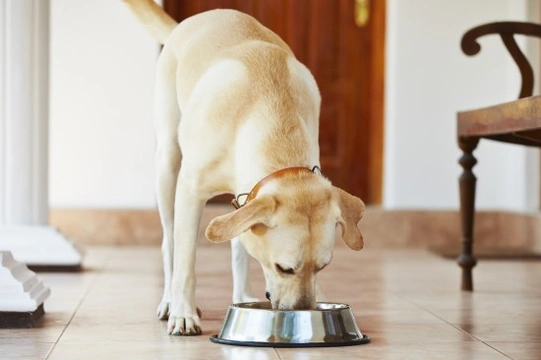Pets
Pets for studWanted petsBreedersAccessories & services
Knowledge hub
Support
Support & safety portal
How to help a skinny dog gain weight
When most people, dog lovers included, are asked to pick out a healthy weight dog, they will almost always point to a dog that is slightly overweight and carrying a little bit of extra padding! A dog that is truly at their optimum weight will be lean and muscular, without a padding of fat around the stomach and ribs, and often, dogs such as these in the peak of fitness will wrongly be considered to be underweight.
However, if your dog is genuinely underweight, despite your best efforts to feed them up and provide them with enough food and a balanced diet, it can be challenging to know how to approach matters in terms of helping them to gain sufficient weight to be considered optimum. Read on for our tips and advice on helping a skinny dog to gain weight.
Is your dog actually underweight?
Step one is of course establishing if your dog is underweight or not! Most complete dog foods offer feeding guidelines based on the size of the dog, but there are of course significant differences between breeds. A Greyhound and a Golden Retriever may be around the same height, but naturally, the Goldie will weigh more at their healthy weight!
You should be able to feel the ribs of a healthy weight dog without having to press too hard, but generally, your dog may be considered to be underweight if you can actually see their ribs.
Might your dog have worms?
One of the main culprits of weight loss in dogs and a failure to gain weight despite eating enough is intestinal worms, so make sure that your dog’s worming schedule is up to date! It is also worth talking to your vet about the best wormer to use for your dog, as there are a great many different types of worms, and not all wormers will eradicate all of them.
Is there an underlying health problem?
A wide range of health problems can potentially lead to your dog being underweight, either because their appetite will be affected, or because the condition keeps them from gaining the full benefit of their meals. Diabetes, stomach and intestinal problems and dental issues are all potential culprits, so discuss your dog’s weight with your vet, and see if they can help you to identify any underlying cause for being underweight.
Are you feeding enough?
Check of course that you are feeding your dog enough food to provide them with enough calories to reach their ideal weight, which may mean feeding more than the packaging guidelines tell you to provide. Some dogs have smaller appetites than others, and of course some are finicky eaters, so they are unlikely to suddenly be willing to eat much larger portions than normal, so you may need to increase your dog’s meal sizes gradually, and supplement them with higher calorie treats and additions to help your dog get the most calories per bowl.
Does your dog’s food intake match their energy expenditure?
If your dog is very busy and active more so than they previously were, they will burn more calories going about their daily lives, and their previous food allowance may not be sufficient to keep up with this. Ensure that if your dog receives more exercise or otherwise becomes more active, you up their food portions accordingly to support this.
Does your dog like their food?
While most dogs will eat most foods, especially if they are hungry, if your dog does not seem overly enthusiastic about their dinner or picks at their food, they might possibly simply not like it. This can sometimes be the case when changing over from a cheaper dog food to a more expensive one with better quality ingredients, as cheaper dog foods are often full of additives, salts and sugars to make them tasty- so make any changes gradually. If your dog simply does not like the food that you give them, you might have to keep trying others until you find one that they like!
Are you feeding too many empty calories?
If your dog is underweight and this is concerning you, it can be very easy to fall into the trap of feeding them treats constantly, and letting them eat whatever they want to. However, this can be totally counter-productive, as feeding fatty foods and empty calories such as chips, bread and other stodgy dishes will simply fill your dog’s stomach without fulfilling their nutritional requirements, and put them off eating their proper meals.
You may need to supplementary feed your skinny dog some nutritious and higher calorie additions to their meals to help with weight gain, but this should be approached with a clear plan in mind, and not undertaken simply by letting the dog have anything they want to eat and leaving their actual meals.



